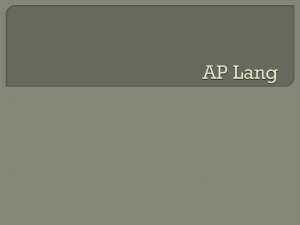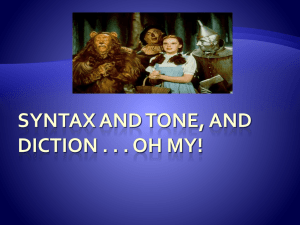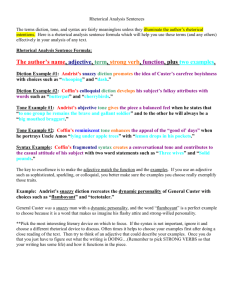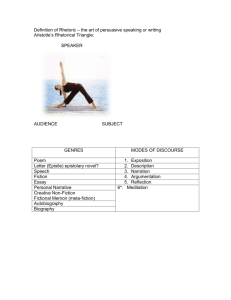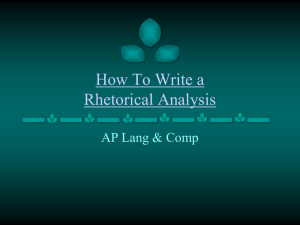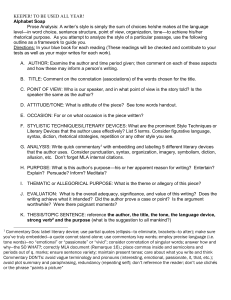AP Lang
advertisement
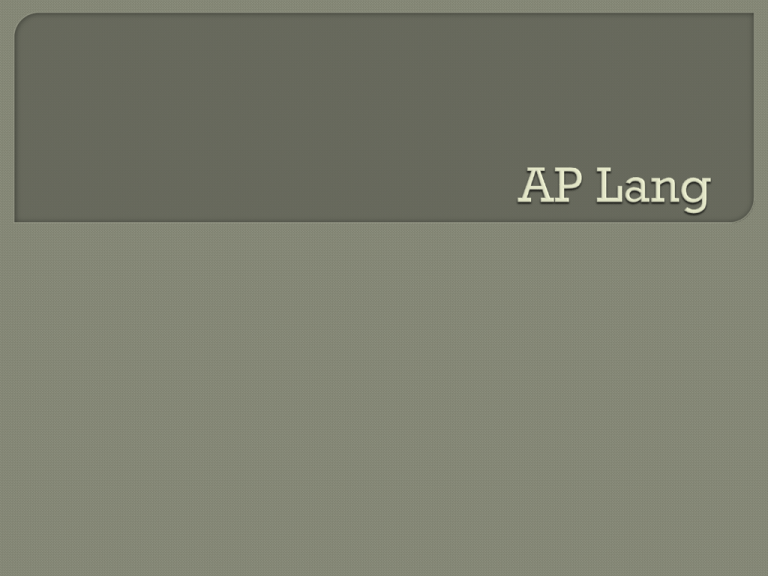
Speeches First Book groups Cornell Notes How-to Suggested Weekend work- start thinking about independent reading At least 200 pages Nonfiction highly suggested Thank You for Arguing is my recommendation The cool kids call them Cnotes In 1885, Hermann Ebbinghaus did extensive research around the idea of forgetting. In his book, Memory: A Contribution to Experimental Psychology, he mapped out the rate at which the average human forgets information over time. Ebbinghaus went on to examine how frequently a student would need to revisit information in order to regain near perfect recall. His research evinces the brain’s ability to retain information, when we revisit the information during key times. The idea is that the Cornell notes setup builds in ways to review your notes at those critical points by hiding or revealing different parts of the material so you can quiz yourself. Check your Summer Reading Discussion Notes- be ready to give me a commitment by the end of class Homework for Monday Chapter 1 in Lang&Comp with Cornell Notes Make a T- chart Left column • “Says” Right Column • “does” 1. What details can you group together to draw a bigger inference? Label them with an adjective 2. What emotional tones does the painting convey? 3. What seems to be a theme of the picture? New T-chart • Says/Does http://www.youtube.com/watch?v=_lfxYhtf8o4 Cornell Notes for pages 1-27 due Monday QuestBridge info Double-check independent reading. Have your book by next Thursday Names Quiz takers? Consider: An aged man is but a paltry thing A tattered coat upon a stick… W.B. Yeats, “Sailing to Byzantium” Discuss:What picture is created by the use of the word tattered? By understanding the connotations of the word tattered, what do we understand about the persona’s attitude toward an aged man? Apply:List three adjectives that can be used to describe a pair of shoes. Each adjective should connote a different feeling about the shoes. Take out that says/does chart from Wednesday You Are Not Special speech Missing Letters- SPENCER • No late penalty Names Quizzes continue Have out your homework Cornell Notes and your Says/Does chart from the McCullough speech Homework- Make notecards for the terms in Ch 1 Consider: The man sighed hugely. E. Annie Proulx, The Shipping News Discuss: What does it mean to sigh hugely? How would the meaning of the sentence change if we rewrote it as: The man sighed loudly. Apply: Fill in the blank below with an adverb: The man coughed ___________________. Your adverb should make the cough express and attitude. For example, the cough could express contempt, desperation, or propriety. Do not state the attitude. Instead, let the adverb imply it. You Are Not Special speech 1-10 for Logos, Ethos, Pathos • Watch for how he establishes L/E/P • Note the structure of the speech In your opinion, what were the 3 most important things the speech Does? title+ author+ active verb+ term+ example 1+ example 2+ purpose. Example: In “Leaving Home” by Norman Rockwell, the artist employs contrasting clothing of working class denim versus a summer suit between father and son, respectively, to demonstrate the stark differences between their occupations. What might the metaphor- “throw them a lifeline” look like in real life? • Be creative if you need to, but if you can draw from your own life experiences, it’ll help you more in a bit Emails Finishing up “You’re Not Special” Summer Reading • 3- good start • 2- some promising work • 1- You have lots of room to improve Have your IRB in class tomorrow Tonight- Read 36-48. Think of Angelou’s “My First Lifeline” as you read their analysis of Didion and compare their suggestions of dialectical journals to the annotating I presented yesterday. • As always- add the bold words to your notecards Not Ethos from yesterday, Pathos as propagandistic and polemical- Somebody should have called me on that one! “It is a far, far better thing that I do, than I have ever done; it is a far, far better rest that I go to, than I have ever known” ~ Charles Dickens A Tale of Two Cities Discuss: Put the sentence into your own words. How does the sentence’s complexity add to its impact? Where are the most important words – at the beginning or at the end? What effect does this have on the reader? What is the effect of the rhyme and repetition in this sentence? What function does the colon serve in this sentence? Apply- Using Dickens’ sentence as a model, write a sentence using repetition for emphasis and a progression of ideas. Insert a semicolon as well if you dare. For nearly a year, I sopped around the house, the Store, the school and the church, like an old biscuit, dirty and inedible. Then I met, or rather got to know, the lady who threw me my first life line. He was a year older than I, skinny, brown as a chocolate bar, his hair orange, his hazel eyes full of mischief and laughter. ~Esmerelda Santaigo, When I was Puerto Rican Look carefully at the way this sentence is written. All of the words that follow the word I are used to describe the he of the sentence. They are adjectives and adjective phrases. This is not the way words are usually ordered in English. (Usually, adjectives are right before the nouns they modify, or at least next to them.) What effect does this word order have on the meaning of the sentence? Placing all of the adjective phrases one after the other is called layering. What effect does this layering have on the He was a year older than I, skinny, brown as a chocolate bar, his hair orange, his hazel eyes full of mischief and laughter. He (She) was ___comparative of an adjective___ than I, ___adjective____, ____simile that describes the subject_____, his/her hair ___adjective____, his/her eyes ____adjective phrase_____. Diction Syntax Tone style Schemes and Tropes (you won’t really need these unless you major in English or go to grad school) Metaphor and simile- figurative language Personification Hyperbole Parallelism Juxtaposition Antitheses To the Mattresses! • Err, laptops Homework- 4 diction annotations on “Lifeline” Bring paper copies of your “Lifeline” Essays tomorrow to class. You’ll be annotating your own. What level is the diction- formal or informal and is it general or concrete? What are the effects of diction on meaning and tone? Apply- Write 1 diction annotation for this excerpt The instructor said, Go home and write A page tonight. And let that page come out of you– Then, it will be true. I wonder if it’s that simple? I am twenty-two, colored, born in Winston-Salem. I went to school there, Then Durham, then here To this college o nthe hill above Harlem. I am the only colored student in my class. The steps from the hill lead down into Harlem, Through a park, then I cross St. Nicholas, Eighth Avenue, Seventh and I come to the Y, The Harlem Branch Y, where I take the elevator Up to my room, sit down, and write this page. Langston Hughes, “Theme for English B” Homework- Study for tomorrow’s Quiz. • Be ready for anything- especially for analyzing a piece of writing like they do with the Didion essay in Ch 2 But that is Cooper’s way; frequently he will explain and justify little things that do not need it and then make yup for this by as frequently failing to explain important ones that do need it. For instance he allowed that astute and cautious person, Deerslayer-Hawkeye, to throw his rifle heedlessly down and leave it lying on the front where some hostile Indians would presently be sure to find it – a rifle prized by that person above all things else in the earth – and the reader hers not work of explanation of that strange act. There was a reason, but it wouldn’t bear exposure. Cooper meant to get a fine dramatic effect out of the finding of the rifle by the Indians, and he accomplished this at the happy time; but all the same, Hawkeye could have hidden the rifle in a quarter of a minute where the Indians could not have found it. Cooper couldn’t think of any way to explain why Hawkeye didn’t do that, so he just shirked the difficulty and did not explain at all. Mark Twain, “Cooper’s Prose Style,” Letters from the Earth Discuss:What is Twain’s tone in this passage? What is central to the tone of this passage: the attitude toward the speaker, the subject, or the reader? How does Twain create the tone? Apply: Write a paragraph about a movie you have recently seen. Create a critical, disparaging tone through your choice of details. Use Twain’s paragraph as a Homework- Annotate and polish your own lifeline. Bring 6 annotations and polished copy to class tomorrow. Submit the writeup to Turnitin.com as well. Warmup 8 Summarize the Custom House so far. Describe its diction and tones if you dare. Have you ever kept a secret for someone to keep them from getting in trouble? Have you ever been judged for doing something? Have you ever felt guilty? Have you ever felt guilty for keeping a secret to protect yourself? Have you ever experienced prejudice as a woman? Have you ever been publicly humiliated? Have you ever been publicly blamed for something when you aren’t the only person who did it? Have you ever sought revenge on someone? Would you ever allow someone to take the blame for you if you knew they would be publicly humiliated? MA- Master Annotaters Are: • Katie W • Saira • Megha • J.R. • Anna If you were going to have a letter labeling you for something you’re embarrassed about, what would the letter be and what would it stand for? Brother, continue to listen. You say that you are sent to instruct us how to worship the Great Spirit agreeably to his mind; and, if we do not take hold of how the religion which you white people teach, we shall be unhappy hereafter. You say that you are right and we are lost. How do we know this to be true? Chief red Jacket, “Chief Red Jacket Rejects a Change of Religion” Discuss: The words “you say” are repeated several times in the sentence. What is the repetition’s function? The question at the end of the passage is a rhetorical question. What attitude toward the audience is expressed by the use of a rhetorical question? Apply: Write a three-sentence paragraph modeled after Chief Red Jacket’s passage. The first two sentences should contain repetition; the third sentence should be a rhetorical question. Your topic is school uniforms. Homework- Ch 2 39-54 • + SL 17-31 with notes • Bring Textbooks Tomorrow! Remember, this is the first day since I’ve given them to you that I’ve asked you to lug them around. I need you to be able to deliver, or I’ll have to say carry them all the time As with diction, for syntax, you look for patterns and for breaks in patterns. When you feel you’re getting the hang of that, start branching out into some of the specialized terminology. The Custom House at Salem Maritime NHS is the last of 13 Custom Houses in the city. There has been a Custom House in Salem since 1649, collecting taxes on imported cargos first for the British Government during the Colonial period, then for the American Government after the establishment of the U. S. Customs Service in 1789. This Custom House was built in 1819 and housed offices for the officers of the U.S. Customs Service, as well as an attached warehouse, the Public Stores, used for the storage of bonded and impounded cargo. The Custom House symbolized the Federal Government's presence in Salem, requiring the architects to design an impressive building. High ceilings, a sweeping staircase, and beautifully carved woodwork all contribute to a feeling of strength and stability. The Salem Custom House was used by the U. S. Customs Service into the 1930s, and the furnishings reflect the long use of the building. Images and Information Courtesy of the National Park Service Website: NPS.org The Collector's offices were furnished with rich colors and fine furniture. The furniture in these offices was purchased by the Customs Service in 1873. In 1826, a wooden eagle was placed on the roof. It was carved by Salem craftsman Joseph True, and its original cost was $50.00. In 2004, the original eagle was replaced with a fiberglass replica. After several years of conservation work, the Joseph True eagle will be going on display in the Custom House in 2007. P5 What does the Rhetorical Triangle for The Custom House look like? Backlash against 18th century Enlightenment which focused on science as a way to find truth Builds on British Romanticism which started at the turn of the 19th century, many see an influence of the French Revolution. Seen in the works of British poets William Wordsworth and Samuel Coleridge. Builds to Transcendentalism Characteristics of American Romantic Literature • Distrust of “civilization” and cities • Nostalgia for the past • Focus on individual freedom • Appreciation of the beauty of nature • Interest in the supernatural Hero seems youthful, innocent Heroes love nature and hate “civilization” Heroes distrust women who are seen as “civilizing” and constraining Heroes often journey from the city to nature • Getting away from cities allows the hero to focus on using their imagination and find “truth” in nature that can’t exist in a city Often requires a strong “suspension of disbelief” In European literature, the wilderness is often a frightening, violent place. In American Literature, wilderness is idealized as a place of freedom, connects to growth in American nationalism Homework- Annotate Kennedy’s speech for the abundance of rhetorical devices— antithesis in particular, but also parallelism, allusion, metaphor, and alliteration (add on anaphora and zeugma if you’re bold) Warmup 10 Summarize Section 2 of Custom House. Use last night’s notes for reference Antithesis- parallel syntax with opposite idea • “It was the best of times, it was the worst of times” parallelism- repeated syntax • “Roses are red/ violets are blue” Metaphor- implicit comparison • “Juliet is the sun” Alliteration-repeating sounds at the start of several closely placed words. • “The harried woman hurriedly packed her horrid bag.” a reference to a place, person, or something that happened. This can be real or imaginary and may refer to anything, including paintings, opera, folk lore, mythical figures, or religious manuscripts. The reference can be direct or may be inferred Allusions are rhetorical shortcuts they allow the writer to give an example or get a point across without going into a lengthy explanation. Allusions are risky because they’re contingent on mutual knowledge between speaker and audience. He was a real Romeo with the ladies.” “Chocolate was her Achilles’ heel He was a Good Samaritan yesterday when he helped the lady start her car.” “She turned the other cheek after she was cheated out of a promotion.” “This place is like a Garden of Eden.” Develop “Allusion Antennae” and look things up when you come across them. Mike titled a recent physics lab email “More Trouble in River City” and lost some folks Scarlett's Red Dress Scene American Heritage Dictionary says scarlet woman • A prostitute, an immoral woman, as in Malicious gossip had it that she was a scarlet woman, which was quite untrue . This expression first appeared in Revelation 17:5, describing Saint John's vision of a woman in scarlet clothes with an inscription on her forehead, "Mystery, Babylon the Great, the mother of harlots and abominations of the earth." Some interpreters believe she stood for Rome, drunk with the blood of saints, but by about 1700 the term was being used more generally for a woman with loose morals. Anaphora- Repeating words at the beginning of poetic stanzas or sentences. What Anaphora have we seen lately? Zeugma-any case of parallelism and ellipsis working together so that a single word governs two or more other parts of a sentence • Ellipsis- the act of leaving out one or more words that are not necessary for a phrase to be understood. This may be done with punctuation (…) but also with syntax. “Begin when ready” for “Begin when you are ready” • Histories make men wise; poets, witty; the mathematics, subtle; natural philosophy, deep; moral, grave; logic and rhetoric, able to contend. (Francis Bacon[13]). • The more usual way of phrasing this would be: "Histories make men wise, poets make them witty, the mathematics make them subtle, natural philosophy makes them deep, moral makes them grave, and logic and rhetoric make them able to contend." Kennedy's 1961 Inauguration Speech 1. 2. 3. 4. Why are so many of the words abstract? How do words like “Freedom,” “poverty,” “devotion,” “loyalty,” and “sacrifice,” impact tone? Are there clichés in the speech? Are there fresher metaphors? Where? Can you find examples of archaic diction? Where? To what effect are they employed? More than 20 of the sentences he uses are complex (check your packet if you need to) how does that sentence type create an energetic ethos? Custom House video
